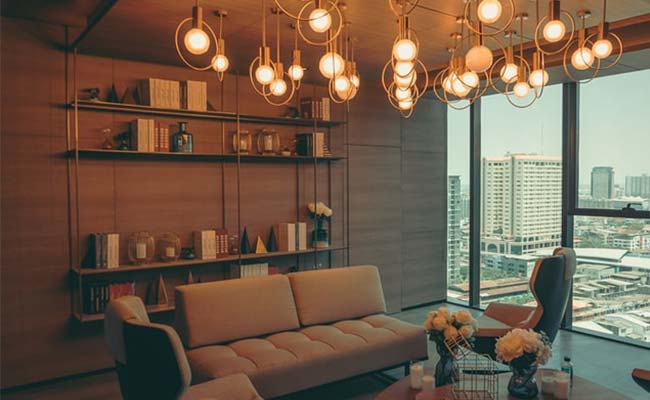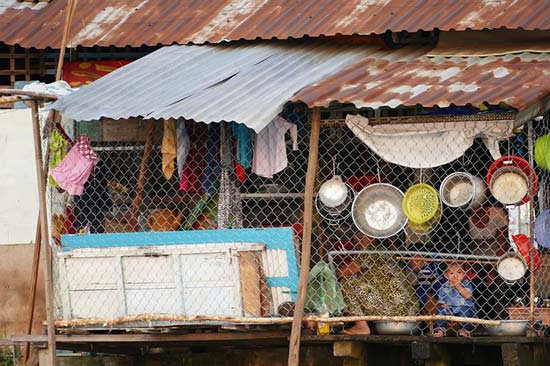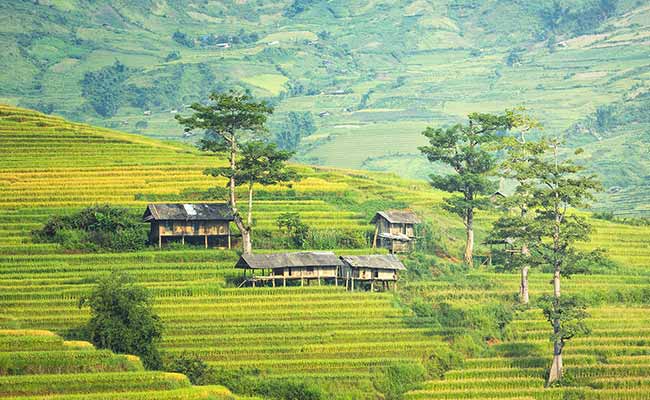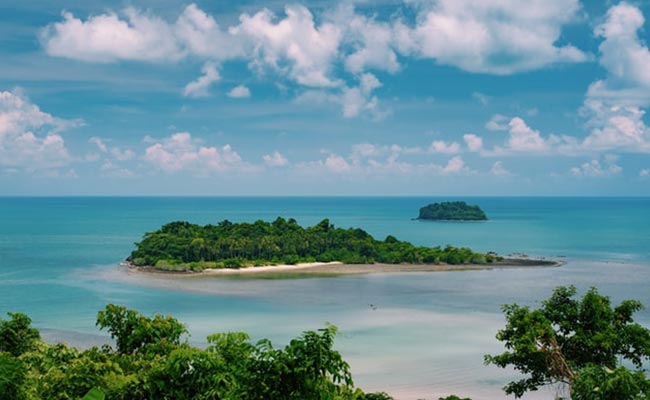Renting an apartment in Thailand is an exciting prospect, but before you start your search for the perfect condo, you'll want to read up on how the process differs from renting in your home country.
In this guide, you'll learn everything you need to know, from accommodation types and pricing to lease contracts, deposits, utility bills, living environment considerations and more.

Contents
Types of Apartment
1. Modern Apartments
Built within the last decade or so, modern apartments are characterized by their relatively compact size yet sophisticated interior designs, which often surpass those of older buildings.
The prevailing trend in modern Thailand, as in many countries, is to maximize the number of units within a building to optimize return on investment.
Many modern apartment complexes feature amenities such as a gym, albeit typically on a smaller scale, and a swimming pool. Some may also offer an on-site restaurant, which is usually accessible to the public, too.
Additionally, each unit may have an integrated washing machine, though communal washing machine areas are also common. In reality, most expats choose the convenience of having their washing done by a local service. Dishwashers aren't so common, but may feature in higher-end places.
2. Older Apartments
In contrast to their modern counterparts, older apartments in Thailand tend to offer more spacious living quarters at a lower rental cost. However, they often lack the contemporary amenities found in newer buildings such as a gym and swimming pool.
Moreover, the lower rental price of older apartments can sometimes attract less desirable neighbors, potentially impacting your overall living experience.
The older an apartment block gets, the cheaper (generally speaking) the rent becomes. The reason for this is the high availability of modern buildings. Renters prefer newer living quarters, and in places like Bangkok, Pattaya, Chiang Mai, Hua Hin, Samui, and Phuket, new builds are constantly entering the market, providing ample choices.
From my observations over the years, older apartments tend to have more problems with pests like cockroaches.
3. Serviced Apartments
Serviced apartments represent a premium housing option, commanding higher rental rates due to the size of the units and the additional services they provide, some of which are akin to those offered in hotels.
These apartments boast amenities such as regular cleaning services and the option for room service, especially if an on-site restaurant is available.
In Thailand, serviced apartments offer enhanced security measures. Visitors are required to sign in and wait in the reception area until they are collected by a tenant, rather than being allowed to take the lift straight upstairs. Typically, there is full-time reception staff available. Additionally, serviced apartments often provide better parking facilities.
Beyond facilities, you can expect superior maintenance services, including pest control, air-conditioner servicing, and upkeep of the grounds (garden). The units themselves are usually furnished with higher quality materials compared to standard apartments, featuring superior flooring, fixtures, and more comfortable bedding.
Condo Vs Apartment
Although these words are often used interchangeably, there is a distinction in Thailand. Apartments are typically managed properties with a front office (though not necessarily a reception area) where assistance is available to address queries and problems. All apartments are owned by the building owner, rather than being individually owned and rented out privately.
Condos, on the other hand, consist of privately owned units within a building, rented out individually by their owners. Consequently, any maintenance issues within a condo unit must be handled by the landlord. If there is a front office, its role is primarily to direct visitors and handle common residential inquiries.
Personally, I prefer apartment complexes because the units and the building are owned by the same entity. This centralized ownership ensures that maintenance is managed uniformly, with a single point of contact for all issues.
In a privately owned condo, for example, if there were a problem such as water leakage from an adjacent or upper unit, your landlord would need to communicate with the other landlord to resolve it. However, this could lead to complications if the other landlord insists it's a building issue and directs them to contact the building owner.
That said, many of the newer, upscale buildings consist of private condo units. Therefore, whether you opt for an apartment or a condo may depend on your preference for unit type, as well as the rental market and availability in the area you're considering.
Finding the Perfect Rental in Thailand
A practical approach to finding an apartment is to explore the area firsthand. Putting boots on the ground allows you to gauge the neighborhood's atmosphere and proximity to essential amenities such as shops and transportation.
Once you've identified your desired location, simply visit apartment buildings that catch your eye and enquire at the front desk about availability.
Additionally, you can utilize property finder websites to conduct a targeted search for buildings in your preferred area.
For those relocating from abroad, although you may not have the opportunity to physically explore the area, you can leverage the internet for research. Online tools like Google Maps, Street View, YouTube videos and user-generated images offer valuable insights into neighborhoods and apartment complexes.
However, I am still of the opinion that securing a more favorable rental rate is often achievable when you're physically present in Thailand. This is because property owners may need to pay fees to agents, which could impact the rental rate they offer.
Considering this, it's prudent to arrange a short-term stay in a place you're interested in. While there, take the opportunity to visit other neighborhoods for comparison before committing to a long-term rental agreement, whether it's for six months or a year. This approach allows you to make a more informed decision about where you'll ultimately reside.
If you want to research rentals online, check out these popular Thai property websites:
Rental Prices
There are several factors that contribute to the higher cost of renting an apartment:
- A newly constructed building with appealing furnishings.
- Amenities such as a gym, pool, and on-site restaurant.
- Proximity to tourist hotspots with numerous hotels and bars.
- Living adjacent to a BTS (overground) or MRT (underground) station.
- Residing close to the city center.
- Having popular malls and other shopping destinations within walking distance.
Nevertheless, it is often possible to strike a balance and find a middle ground where convenience is still within reasonable reach without having to pay the premium for immediate proximity to amenities.
In terms of pricing, it's difficult to give exact numbers – because pricing depends on the area and the demand for a particular building – but let's consider some examples in Bangkok:
- 16,000 THB: New build 46 Sq.m studio, 500m to a BTS station, swimming pool, 5 stops from the center of town.
- 20,000 THB: New build 35 Sq.m 1-bed, 600m to a BTS station, gym and pool, close to the center of town.
- 20,000 THB: 12-year-old 60 Sq.m 2-bedroom, 500m to a BTS station, gym and pool, close to the center of town
- 25,000 THB: New build 57 Sq.m 2-bedroom, 500m to a BTS station, close to the center of town (no pool or gym)
- 30,000 THB: 20-year-old 112 Sq.m 2-bedroom, 1km to a BTS station, close to the center of town (no pool or gym)
- 30,000 THB: 20-year-old 112 Sq.m 2-bedroom, 1km to a BTS station, close to the center of town (no pool or gym)
- 75,000 THB: 15-year-old 75 Sq.m 2-bedroom, 2 Bathroom, gym and pool, in the center of town close to tourist area.
* prices are per month
For every example given above, no doubt someone will tell you that you can find something cheaper in the same/similar area. You probably can. However, these examples give you some idea of what you will get for your money at various price points.
Lease Contracts
There is no Landlord-Tenant Act in Thailand. The legal basis for a lease is governed by the Hire of Property section in the Civil and Commercial Code of Thailand.
Most rental contracts are for 12 months, but some residences offer 6 months. Again, it depends on the demand for the area and the building and the age of the property.
A lease tends to be a pretty simple document in Thailand; a one or two page document that you will have to sign before moving in.
My last apartment lease was translated into English on the same page as the Thai, but crudely so, and the translation wasn't very accurate. Regardless, it was good enough to understand the basic terms.
Your lease might be presented to you in Thai only. You can request a translation, but that will most likely be at your cost. At the end of the day, it's pretty simple to interpret the terms: pay your rent and don't damage the apartment, or else!
Seriously, though, overall I've had good experiences renting in Thailand. If you're a respectful tenant then you'll get respect in return. If you turn up at 3am, blind drunk, with a hooker on each arm, singing “show me the way to go home…” you can expect to get a telling off, and to lose the respect of your neighbors.
Utility Bills
Water and electric bills are itemized separately to your rent. These should be billed at the set government rates, but some buildings charge a higher rate and get away with it by claiming a form of surcharge.
Utility bills may be included in the rental price by a private landlord (condo unit owner), but if they are you can assume you are paying more than you would if you paid the bills yourself.
The price of electricity in Thailand is 5.95 Baht/unit (one kilowatt per hour (kWh) of electricity used).
The price of water for the first 10 units is 10.20 Baht per unit, with a minimum of 50 Baht (4 m³).
Paying a Deposit
You will need to allocate a portion of your budget for the deposit when securing your rental accommodation.
Typically, landlords require an upfront payment equivalent to two months' rent, in addition to the regular monthly rent payment for that period.
However, it's worth noting a provision established by a law passed in 2018: if your landlord owns more than five units, you may only be obligated to pay a one-month deposit.
Regarding the return of your deposit, while you should expect to receive it back, the full amount may not always be refunded.
Landlords often meticulously inspect the property for any damages upon your departure, such as marks on walls that necessitate repainting. Additionally, nearly all landlords impose a cleaning fee upon move-out, typically around 500 Baht, to ensure the property is left in a satisfactory condition.
I have an entire article dedicated to “deposit conflict avoidance” and how to ensure you get yours back in full. You can read that here.
Building Security
The good news is that most residential buildings have a security guard on duty, night and day.
These unarmed, usually sleepy guards aren't there to tackle and arrest robbers, but they are a good crime deterrent and do log suspicious activity.
Many buildings have a traffic barrier at the entrance, at which the security guard checks cars in and out. CCTV is usually in operation, too.
Other than a guard, some buildings have a front desk to prevent unwanted visitors (mostly serviced apartments), and you'll have a lock on your door. Even the first floor windows of a residential block are too high for burglars, so in general you're very safe.
The good news is that most residential buildings maintain a security presence round the clock, with a security guard on duty both day and night.
These unarmed, usually sleepy guards aren't there to tackle and arrest robbers, but they are a good crime deterrent, and responsible for logging any suspicious activities rather than engaging in confrontations or arrests.
Many buildings are equipped with a traffic barrier at the entrance, where the security guard monitors vehicle ingress and egress. Additionally, CCTV surveillance is commonly employed for added security measures.
In some buildings, particularly serviced apartments, a front desk is manned to restrict access to unwanted visitors. Furthermore, residents typically have locks on their doors for added safety.
Hot Tip:
Most ground-floor windows in residential blocks tend to be positioned too high for potential burglars to access easily, providing an additional layer of security. Those that aren't, and have ground-floor balcony spaces, usally cage the balcony for protection.
On some islands, however, this isn't the case.
In fact, I experienced a burglary in my first apartment in Koh Samui. In hindsight, I realize I was quite naive, as I rented a ground-floor unit without considering the potential risks. The building had no on-site security, either.
My apartment featured a double door in the front room that opened onto a small concrete area where I could hang laundry or place a chair. This space was adjacent to another property and accessible to anyone who sneaked around the side of the building. The door itself had an aluminum frame and a rather questionable lock.
One day, upon returning home, I discovered the door open and my camera missing from the table. The police, who came promptly when called, attributed the incident to opportunistic “ladyboy thieves”, who were apparently operating in the area. They even cheekily asked if I had entertained any in my room! Hehe.
So learn from me, and don't make the same mistake.
Transport Links
When selecting a place to live, transportation plays a crucial role.
In a bustling, humid city like Bangkok, proximity to an MRT (underground) or BTS (overground) station is highly desirable. Ideally, you'll want to be within a five-minute walk from a station to avoid arriving at your destination hot and sweaty, whether it's for work or a social engagement.
Some upscale residential complexes even provide a shuttle service to and from the nearest station.
If you live more than a brief walk from the station, another option is to utilize motorbike taxis, which typically charge between 10 to 20 Baht for short rides. You'll usually find a local taxi rank conveniently located near your apartment, providing easy access to onward transportation for longer journeys.
Noise
Noise is a significant concern for me, as I am an extremely light sleeper and often resort to wearing earplugs.
In bustling cities like Bangkok, the noise level on main roads can be quite intense, as the city never truly sleeps, with constant traffic contributing to the din.
Even on quieter side streets, disturbances abound, from barking dogs to teenagers revving motorbikes with loud exhausts, or simply people speaking loudly at all hours.
In more tranquil locations such as some islands or rural areas like Pai, you may escape the urban cacophony, but new challenges arise. Instead of roaring traffic, you might contend with the crowing of roosters heralding the dawn.
Thai culture often sees people rising early to tackle tasks before the mid-morning heat sets in. Thus, if you're inclined to sleep in, be prepared for the surrounding hustle and bustle to commence early.
Considering these factors, it's advisable to seek out buildings set back from main roads, ideally a few streets away. While narrow streets may pose challenges for taxis, they typically experience less through traffic, providing a quieter environment both day and night.
During property viewings, carefully survey the immediate surroundings for potential noise sources such as bars, train tracks or ongoing construction projects, to ensure a more peaceful living environment.
Pets
My advice is to refrain from acquiring pets in Thailand, particularly if you're living in a city. While there are some pet-friendly condos available, they are relatively scarce, and owning a pet can significantly limit your housing options.
Furthermore, keeping an animal in a small 35 sq. ft condo isn't very practical and can become a hassle when you need to move or relocate.
If you're set on having a cat or dog, you're better off seeking a house to rent in a rural area where space and pet-friendly accommodations are more readily available.
For those planning to move to Thailand with a pet, it's essential to secure a pet-friendly landlord before your relocation. Additionally, be aware that your pet may be subject to a 30-day quarantine period at the discretion of quarantine officers upon arrival.
+ More on pet import rules here
Disability
Some modern condo and apartment buildings feature wheelchair access ramps, while most modern buildings are equipped with lifts.
However, it's important to note that accommodation in Thailand is not as disability-friendly as it should be. Therefore, if you have a disability that restricts your ability to use stairs, it's advisable to inquire about the fire escape measures in place for disabled persons in case of an emergency.
This could involve asking about alternative evacuation routes, such as designated safe areas or specialized equipment for evacuation, to ensure that all residents, regardless of mobility, are adequately prepared for emergency situations.
In Summary
Renting in Thailand offers many options catering to various lifestyles and preferences. From modern apartments boasting upscale amenities to older, more spacious accommodations, you can find a suitable home that fits your needs and budget. Moreover, the distinction between apartments and condos provides flexibility in terms of ownership structure and management style.
Renting is as cheap or expensive as you want it to be. But upon comparison, you will find it way cheaper than countries like the USA, UK, Canada, Australia, Germany, France, Switzerland, etc.
The size of some condos may come as a shock, particularly to my American friends, who tend to be used to bigger spaces. But if you up your budget by 5-10k THB the space dramatically increases.
When navigating the rental process, it's essential to consider factors such as transportation accessibility, noise levels and building security. Additionally, understanding lease contracts, deposit rules and utility billing procedures can help you make informed decisions and enjoy a hassle-free rental experience.
There are so many options, particularly in Bangkok. If there's too much noise, or you're not close enough to the station, or your neighbor likes playing drums at 1am, just move somewhere else. It's that easy.
——
Got a query about renting an apartment in Thailand? Want to add a point that I've missed? Drop it in the comments section below.
Last Updated on



Edward Osterhout says
Edward Osterhout
Apr 06, 2025 at 5:08 am
TheThailandLife says
Apr 07, 2025 at 7:04 pm
Alun Benjamin says
To keep it brief, I will just say I believe I was illegally overcharged by my previous apartment manager for electricity - he charged me 8 baht/unit, where I understand that around 4 baht was the legal maximum for my accommodation.
I have looked high and low for a plain English or Thai statement of the law with which I can confront him, should I be correct, but neither I nor Bing can find legal text or a consumer website that provides this. All I can locate is the PEA tarriff guide for the rate I should have been charged,but it's vague and dense with technical jargon. Not even the Thai Official Consumer Protection Board website (https://ocpb.go.th/ewtadmin/ewt/ocpb_en/main.php) provides plain guidance. I would very much appreciate and sources of official legal text on the matter, which I can, if I am correct) use to obtain recompense for my former landlord.
Many thanks.
Jul 09, 2023 at 4:19 am
S S Sharma says
Anyway what are the rents for fully furnished studio apt for 2 weeks.
Jul 28, 2022 at 10:04 pm
TheThailandLife says
Jul 28, 2022 at 10:09 pm
Damien Coghlan says
Jun 22, 2022 at 6:15 am
TheThailandLife says
Jun 22, 2022 at 3:59 pm